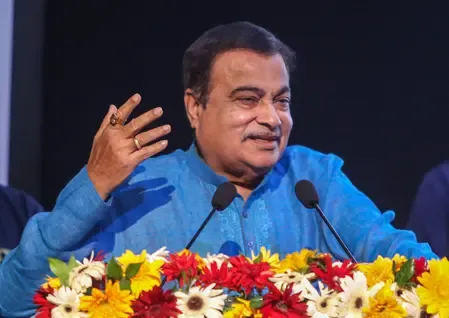Is My Brain Worth Rs 200 Crore a Month? Gadkari's Bold Response to E20 Fuel Critics

Synopsis
Key Takeaways
- Nitin Gadkari's brain is valued at Rs 200 crore a month.
- The E20 fuel initiative is designed to boost farmer income.
- Critics allege water shortages and vehicle compatibility issues.
- The Supreme Court supports the government's E20 program.
- Gadkari emphasizes development over personal gain.
Nagpur, Sep 14 (NationPress) Dismissing the critiques aimed at the government's ethanol-blended petrol initiative as politically driven, Union Road Transport and Highways Minister Nitin Gadkari asserted that his intellect is valued at Rs 200 crore a month and he is financially secure.
During an event hosted by Agricos Welfare Society in Nagpur, he stated: "My brain is worth Rs 200 crore a month. I am not at all short of money, and I don’t stoop low."
His remarks surfaced amidst the backlash against the government's promotion of ethanol-blended petrol. The administration has emphasized that petrol mixed with 20 percent ethanol, known as E20, is a more environmentally friendly fuel and has allowed farmers to secure better prices for their crops, including sugarcane and maize.
Critics have raised concerns that the initiative could result in water scarcity and harm vehicles. In a pointed critique of the minister, they have also claimed that two prominent ethanol companies are operated by Gadkari’s sons.
Without directly addressing the controversy, Gadkari remarked: "I provide ideas to my sons, but I do not engage in deceit."
"Recently, my son imported 800 containers of apples from Iran and exported 1,000 containers of bananas from India to Iran. There are no financial dealings with Iran. My son is involved in import and export. I also own a sugar factory, a distillery, and a power plant. I am not experimenting with agriculture for personal profit," the minister clarified.
Gadkari also underscored his initiatives to encourage local vegetable vendors to set up fruit malls throughout Nagpur. Such efforts empower traders and farmers by facilitating direct sales in prime city locations.
"I am not undertaking these projects for personal profit. My income is substantial. My brain is valued at Rs 200 crore each month. I have no financial constraints," Gadkari stated, emphasizing that his business recommendations are centered on development, not personal gain.
On Thursday, Gadkari countered the critics, accusing them of conducting a "paid politically motivated social media campaign" against the government’s ethanol-blended petrol initiative, which has effectively increased farmers' income and diminished pollution levels in the country.
During the annual Indian Automobile Manufacturers (SIAM) convention in Delhi, Gadkari affirmed that all tests confirmed no issues with the implementation of 20 percent ethanol-blended (E20) petrol.
The minister noted that the production of ethanol from sugarcane, maize, and rice has led to increased prices for these crops, which has consequently boosted farmers' incomes.
He highlighted that farmers earned Rs 45,000 crore from maize alone due to heightened demand and price increases after it was permitted as an input for ethanol production.
Gadkari also pointed out that ethanol blending has contributed to reduced pollution, a topic that was acknowledged at the G20 conference, showcasing global recognition of its success.
Furthermore, he mentioned that the Supreme Court has dismissed petitions challenging the legality and safety of E20 fuel.
The Supreme Court recently rejected a public interest litigation (PIL) concerning E20 blending, which claimed that most vehicles on Indian roads weren't compatible with E20 fuel, posing risks of material degradation, safety hazards, mileage loss, and denial of insurance claims.
In dismissing the plea, the apex court supported the government’s position, underscoring the benefits for sugarcane farmers and the reduction in the country’s oil imports resulting from the E20 programme.
Gadkari also cited studies indicating that high pollution levels are leading to decreased life expectancy among citizens.
He remarked that recent apprehensions regarding engine damage and warranty issues have been proven unfounded. "All testing agencies have verified that there are no problems with implementation," he said.










